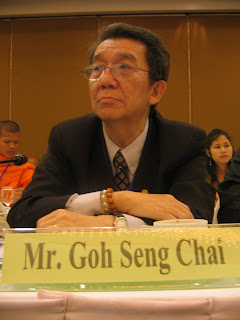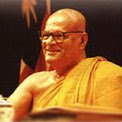
The oft postponed AGM of the Buddhist Missionary Society Malaysia (BMSM) scheduled on Sunday, 2 August 2009 in Kuala Lumpur is expected to see at least two aspiring candidates to square it off for the presidency.
 Ang Choo Hong
Ang Choo HongThe current president Ang Choo Hong is expected to step down after serving as president since 2001. In the absence of other interested unseen hands, the vacancy will most probably see two old friends challenging each other to lead BMSM for the next two years.

Chee Peck Kiat who is currently the Secretary General will be one of the candidates while Goh Seng Chai, a central committee member will be the other candidate offering themselves for the seat expected to be vacated by Ang. Chee Peck Kiat was formerly the president of the society from 1996 - 2001 while Goh Seng Chai has served as the Secretary General of the society intermittenly from 1982 and 2002.
 Goh Seng Chai
Goh Seng ChaiBoth candidates who are in their sixties are not new to the Buddhist community and has been involved in Buddhist organisational activities since early 1960s. Co-incidentally both began to be linked to Buddhist activities during their youth days in Kuala Terengganu during the early days of Buddhist youth activism under the inspiration of the late Venerable Sumangalo (Robert S. Clifton) or more affectionately known as Father Sumangalo to those who were close to him.
 Ven. Sumangalo
Ven. SumangaloThe Terengganu Buddhist Youth Circle (TBYC) was one of the active youth circles during that period. TBYC even hosted the Federation of Malaya Buddhist Youth Fellowship convention in 1964. While Buddhist youth conferences nowadays focus on discussion and planning, the said conference in 1964 focuses on sporting events, social visits and feasts, a reflection of the youth lifestyle during that time.
 Ven Dhammananda
Ven DhammanandaBMSM was form in 1962 by the late Ven Dr Kirinde Sri Dhammananda Nayaka Maha Thera or fondly known as "Chief" to his devotees and the Buddhist circles. One of the main objectives of the society is to encourage the study and propagation of Buddhism. Since its inception, to achieve its stated objectives, two of its main activities were conducting religious talks and publication of booklets and books in Buddhism for free distribution and sale.
Ven Dhammananda played the pivotal role in developing BMSM to a respectable and influential Buddhist organisation. He was a prolific writer and most if not all of the local titles in BMSM publication list were written by him. He gave Dhamma lectures practically in very nooks and corners of Malaysia.
No village is too rural or too far for him to travel, no crowd is too small or too young for him to address. He speaks the Dhamma to all. He speaks gently but firmly with compassion and wisdom. He carries the message of the Buddha and also BMSM's logo everywhere he goes since his publication is widely distributed. The late Chief is endeared by many and a Buddhist icon to many all over the world.
Ven Dhammananda gained his freedom from this world on 31 August 2006 and bequeated his wisdom and knowledge to the people through the millions of publications spread all over the world in multi languages. With his passing, BMSM also lost its Spiritual Director and General Advisor who always touch base with the developments and functions of the society.
After three years of his demised, it is time to review to gauge if BMSM still moving progressively based on the solid foundation laid by Ven Dhammananda or the society is now slowing down and began to live on past glories, surviving on the late Venerable's publication by repackaging its cover without releasing any new and comparable publication.
Within the BMSM circle, other than the limited number of lay persons who still vigorously contributes their time and efforts in delivering Dhamma talks especially in the English language in the name of BMSM, clearly there is no one in the robes that comes close to the late Venerable's stature in propagating Buddhism to the masses and plays the pivotal role in providing spiritual leadership to its members.
Most of the time we only realised our loss and began to grief when a person left and no more with us in this world. That is the reason we need to show our appreciation and gratitude when the person is still with us. It is due to this reason that in 2002 three individuals took the initiative to mobilised the Buddhist community all over Malaysia to confer the Lifetime Achievement Award to Ven. Dr K. Sri Dhammananda.
The three Buddhist workers Goh Seng Chai, Sarath W. Surendre and the author, has been closely associated with the venerable for many years. In less than two months they managed to collect more than 100,000 signature and messages from Buddhist devotees in Malaysia via postcards and a specially dedicated website. The Lifetime Achievement Award from the Malaysian Buddhist community was presented to the late Venerable on 9 December 2002 in front of about 600 Buddhist leaders from 20 countries.
The man is no more physically with us but we can cherish the good memories and follow the wisdom of the great man by continuing his good work started and consolidated by him. It is in this sense that the new leadership of BMSM need to continue the great work by Ven Dhammananda. BMSM as an national organisation with good links to the government and other local and international bodies need to live up to its name as a missionary society and focus on the core duties and obligations to the Buddhist community in Malaysia.
As members of the society, it is not too much to ask the next leadership to be more focus on the study and propagation of the Buddha-Dhamma. As usual there will be different opinions but if we keep to the main life-line of the society which is missionary work, the society should be able to do well to strengthen and protect the Buddhist presence, interest and influence in this country. - Loka




